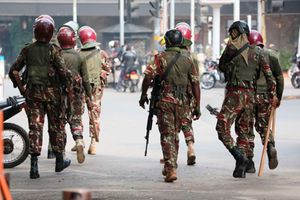
Nairobi County Woman Representative Esther Passaris.
Nairobi Woman Representative Esther Passaris’ proposal to amend the Public Order Act to designate assembly and demonstration zones may not be her original idea; she may have been approached to be the face of it parliamentary records indicate.
For someone who wanted to light up the streets of Nairobi through her Adopt a Light organisation, proposing amendments that seek to limit civil liberties is somewhat an anticlimax.
Born some 60 years ago in Mombasa, Ms Passaris is no stranger to controversy. She recently came under criticism on social media for defending Deputy Inspector-General of Police Eliud Lagat over the murder of teacher Albert Ojwang in police custody. She was also at the centre of a storm over how her Adopt a Light firm got lucrative government deals.
The Public Order (Amendment) Bill 2025, in her name, seeks to limit meetings or public processions within a radius of 100 metres from the precincts of Parliament, a protected area or a building in which a courtroom is situated.
The Nation has established that the Bill, which has since been met with public condemnation, was originally the idea of Deputy President Kithure Kindiki when he was Cabinet Secretary for Interior and National Coordination.
Prof Kindiki while appearing before the Committee on Appointments of the National Assembly on August 1, 2024, following his re-nomination by the President as Interior CS, revealed that he mooted the idea of designated protest areas.
“Before I was dismissed on July 11, 2024, I had actually finalised the draft regulations to the Public Order Act, which will be the statutory instrument to be processed for purposes of giving effect to enjoyment of that right to picket,” Prof Kindiki told the committee.

Deputy President Kithure Kindiki.
Ms Passaris did not respond to our inquiries regarding the Bill.
While Prof Kindiki was proposing regulations to enforce the Public Order Act, Ms Passaris’s proposal seems to have taken it a notch higher, into a fully-fledged amendment Bill.
“If I am approved, this is a low hanging matter,” said Prof Kindiki then. “It is something we can process in the shortest time possible to avoid a situation like what we have had in the past one month of protests, which are unmanaged and which have exposed us to deaths and destruction of property and a lot of inconvenience to the people.”
The revelations by Prof Kindiki were triggered by National Assembly Majority Leader Kimani Ichung’wah.
“You have seen in the past a lot of confrontations between the people and the police. This could be attributed to your failure to designate picketing corners. Kenyans imagine that you can picket anywhere, including in areas you consider restricted areas,” Mr Ichung’wah said.

National Assembly Majority Leader Kimani Ichung’wah.
The government has been mulling how to contain the growing dissent from the people in the form of Gen Z-led protests, with local and foreign human rights agencies as well as foreign nations accusing the police of employing brutal force.
During the vetting, Prof Kindiki said “it is true that there is work that requires to be done to ensure that the people of Kenya enjoy their constitutional right and freedom to assemble, picket and demonstrate”. This right, he stated, “also allows the demonstrators to present petitions to public authorities while at the same time maintaining public order and also ensuring the rights of other people”.
“Those draft regulations, when completed, will be able to help the police do a number of things—obligate the police to escort protesters and provide security for them and also to ensure protesters don’t run amok and overrun members of the public who are not protesting,” Prof Kindiki said.
The rules, he told the vetting committee, would also require those protesting to notify the police and also give the number of protesters so that “proper arrangements are made”.
He further said that public institutions and all arms of government would be obligated to designate an area within their precincts where a group of protesters can stand, demonstrate and present petitions.
Yesterday, city lawyer David Ochami doubted that the proposed Bill is Ms Passaris’ idea.
“For all her bluster in politics, there’s nothing, academically or doctrinally, remarkable about her. She could not have imagined, conceptualised or drafted this Bill,” said Mr Ochami.
The city lawyer claimed that the MP, serving her second term, “must have been prompted by her minders in ODM or UDA who lack her audacity, to come up with this law that’s patently unconstitutional.”
“Clearly, the people of Kenya missed a bullet with ODM not ascending to power in 2022. We don’t expect ODM and its leader Raila Odinga to disavow her because what she’s proposing is in line with ODM’s interest,” he said.





